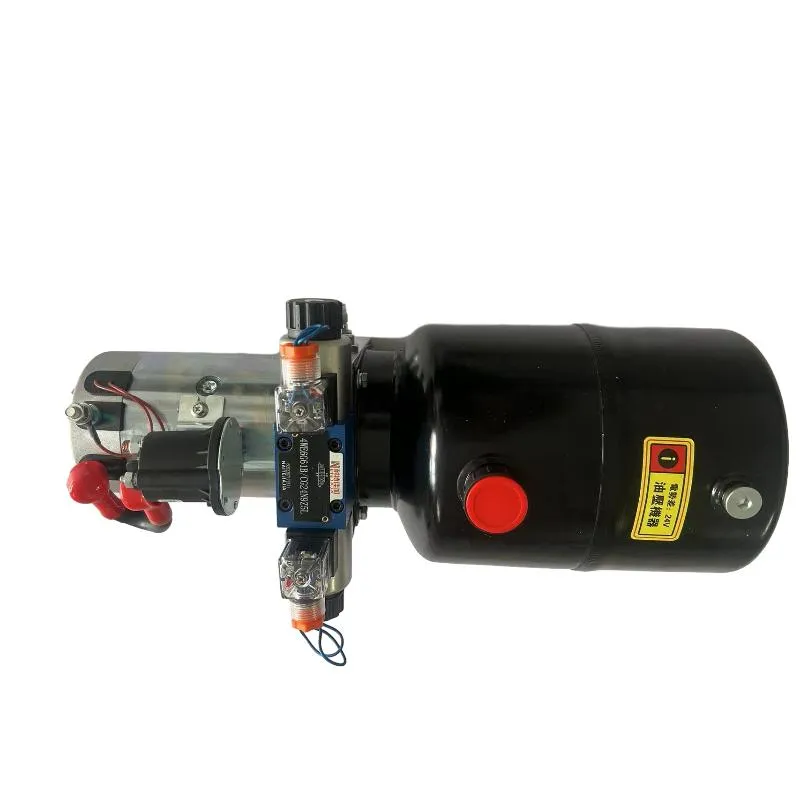Aug . 20, 2024 19:19 Back to list
Premium Hydraulic Cylinder for High-Quality Shop Press Applications
Understanding High-Quality Shop Press Hydraulic Cylinders
In the world of mechanical engineering and manufacturing, hydraulic cylinders are fundamental components in many machines. They convert hydraulic energy into linear motion, playing a crucial role in various applications from automotive repair to metalworking. Among the various types of hydraulic cylinders, high-quality shop press hydraulic cylinders stand out due to their durability, efficiency, and versatility.
What is a Hydraulic Cylinder?
A hydraulic cylinder is a mechanical actuator that uses pressurized hydraulic fluid to produce a force in a linear motion. It consists of a cylinder barrel, a piston, and a rod. When hydraulic fluid is pumped into the cylinder, it pushes the piston out of the cylinder, thereby extending the rod. This mechanism allows for heavy lifting and pressing tasks to be accomplished with relative ease, making it an indispensable tool in many workshops and industrial environments.
The Importance of Quality
The quality of a hydraulic cylinder is paramount. High-quality shop press hydraulic cylinders are designed and manufactured to withstand the extreme pressures and demands of heavy-duty applications. These cylinders are made from robust materials that resist wear and tear, ensuring a longer lifespan and reducing the likelihood of failure. Key features of high-quality hydraulic cylinders include
1. Material Selection The best hydraulic cylinders are crafted from high-grade steel or aluminum alloys, which offer excellent strength-to-weight ratios and corrosion resistance.
2. Precision Engineering High-quality cylinders are engineered with precise tolerances. This precision is essential for ensuring that the cylinder operates smoothly and efficiently, minimizing friction and maximizing performance.
3. Sealing Technology Effective sealing is crucial in hydraulic cylinders to prevent leaks and maintain pressure. Quality cylinders utilize advanced sealing technologies that keep the hydraulic fluid contained and protect internal components from contaminants.
high quality shop press hydraulic cylinder

4. Testing and Certification Reputable manufacturers subject their products to rigorous testing procedures, including pressure testing and fatigue analysis, to guarantee their reliability and safety. Certifications from recognized standards organizations further signify quality assurance.
Applications of Hydraulic Cylinders
High-quality shop press hydraulic cylinders have a wide range of applications across multiple industries. They are commonly used in
- Automotive Repair Hydraulic cylinders are vital in hydraulic lifts and jacks, allowing mechanics to raise vehicles safely and efficiently for maintenance and repair tasks.
- Manufacturing and Assembly In manufacturing settings, hydraulic presses use these cylinders to shape, cut, and assemble materials, increasing productivity and ensuring precision.
- Construction Hydraulic cylinders are employed in heavy machinery, such as excavators and bulldozers, to provide the necessary force for digging, lifting, and moving materials.
- Metalworking They are extensively used in workshops for tasks such as metal bending, punching, and forming, highlighting their versatility in fabrication processes.
Conclusion
Investing in high-quality shop press hydraulic cylinders significantly impacts operational efficiency and safety in various applications. Their ability to endure high pressures and perform under demanding conditions makes them indispensable tools in modern mechanical and industrial environments. When selecting hydraulic cylinders, it is essential to prioritize quality and reliability. Proper maintenance and regular inspections further ensure that these hydraulic systems operate at their best, maximizing their lifespan and performance. Ultimately, the combination of quality engineering, robust materials, and effective design results in hydraulic cylinders that not only meet but exceed the expectations of users across diverse industries.
-
Fork Lift Power Units - Hebei Shenghan | Efficiency, Reliability
NewsJul.13,2025
-
1.5-Ton Turbocharged Cylinder-Hebei Shenghan|Hydraulic Solution,Energy Efficiency
NewsJul.13,2025
-
Auto Hoist Power Units-Hebei Shenghan|Efficiency&Industrial Lifting
NewsJul.13,2025
-
Double Acting Power Units-Hebei Shenghan|Hydraulic Solutions,Industrial Efficiency
NewsJul.13,2025
-
1.5 Ton Lifting Cylinder 70/82-40-290-535 - High-Performance Hydraulic Solution | Hebei Shenghan
NewsJul.13,2025
-
Fork Lift Power Units - Hebei Shenghan | Efficiency&Reliability
NewsJul.13,2025
